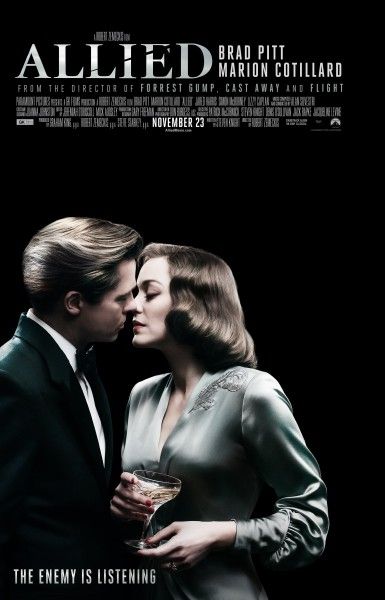On the surface, it looks like director Robert Zemeckis’ wants to turn the World War II spy romance on its head with his latest film, Allied. Although the film lovingly tips its hat towards Casablanca, it wants to question the nature of romance during wartime and if two people who are in the business of lies can ever be truthful with each other. It’s not a bad set-up for what could be a dramatic spin on Mr. and Mrs. Smith, but unfortunate Steven Knight’s screenplay firmly puts its male lead as the audience POV, which robs his female lead of agency and intrigue. What could have been a riveting story of suspicion becomes reduced to a bland single question.
In 1942 in French Morocco, Canadian spy Max Vatan (Brad Pitt) goes undercover with French resistance member Marianne Beauséjour (Marion Cotillard). The two pose as a married couple to take down the German ambassador. Max and Marianne eventually fall for each other and after their mission they move to London, get married, and have a child. One day, Max is called into British intelligence, and they inform him that the real Marianne Beauséjour was killed before Max arrived in French Morocco and that his wife is actually a German spy. Although his bosses give him a way to confirm whether or not Marianne is a spy, Max goes rogue to try and find out if the woman he loves is working for the Nazis.
The first half of Allied is fairly interesting and plays like a neat throwback to the 1940s World War II movies. It doesn’t radically change the genre, but it does a solid job of playing by its rules. Cotillard brings a smoldering intensity to her performance, and she’s wily enough that we’re left to wonder if Marianne is really falling for Max or if she’s just trying to manipulate him. She even goes so far as to tell him, “I keep the emotions real. That’s why it works.” It may be a bit heavy handed to get the audience questioning Marianne, but Cotillard grounds her performance enough that we can also believe she genuinely loves her husband.
The problem arrives in the second half when Max goes on his mission to determine whether or not Marianne is a German spy. Rather than continue to show Marianne’s perspective and how her husband’s strange behavior is affecting her, she becomes a puzzle to solve. She’s no longer a character with wants, needs, and goals, but a thing with a binary solution. She’s either the real Marianne Beauséjour and she can continue living a happy life with Max, or she’s a Nazi spy and she’ll have to be killed by Max. Either way, the story is really only concerned with how this affects Max’s life, and it makes Allied a dramatically less interesting film.
The picture isn’t helped by Zemeckis’ inert direction. There are moments where the director seems to relish the time period and genre, but there are other scenes where he seems like he’s on autopilot. When the S.O.E. Official (Simon McBurney) tells Max that Marianne might be a spy, there’s no intensity to the scene. There’s no urgency or claustrophobia. Zemeckis does nothing to put us in the mind of a man who has just been told that that woman he loves is a traitor and he might have to kill her. It’s the turning point of the film, and yet the scene lacks energy and immediacy.
Allied feels like a bit of a missed opportunity for everyone involved. Pitt’s been in better World War II movies; Cotillard gives a strong performance, but her character is reduced to an object in the second half; and Zemeckis seems engaged at some point in the narrative and there are other times where he seems to be just going through the motions. Allied is a lackluster effort that should have been much better given the central conflict and setting.
Rating: C




